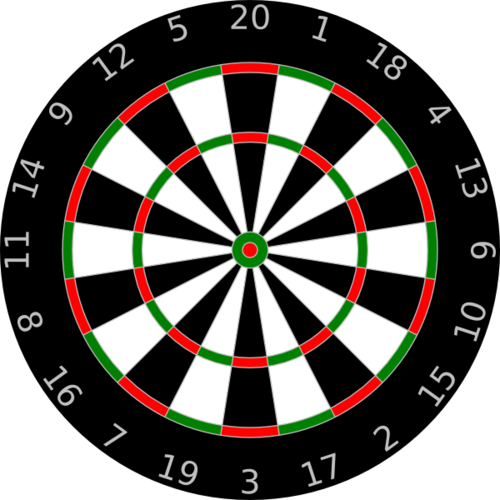Is it possible?
 In my invented game of darts, each dart that you throw will score you either 8 or 15 points. If you are allowed an unlimited number of shots, what is the largest score that
cannot
be attained?
In my invented game of darts, each dart that you throw will score you either 8 or 15 points. If you are allowed an unlimited number of shots, what is the largest score that
cannot
be attained?
The answer is 97.
This section requires Javascript.
You are seeing this because something didn't load right. We suggest you, (a) try
refreshing the page, (b) enabling javascript if it is disabled on your browser and,
finally, (c)
loading the
non-javascript version of this page
. We're sorry about the hassle.
Every possible positive integer i that can be formed with the numbers 8 and 15 should be in the form: i = 1 5 m + 8 n , where m and n are positive integers.
To find the largest number that cannot be formed, we can first start with a number that can be formed and search downwards.
To generalize this process, we can use induction. Suppose we have a number i that can be expressed in the form above. We want to determine if i-1 can be expressed in the form above. We have two cases to consider.
c a s e 1 : n > = 2
i − 1 = 1 5 m + 8 n − 1
= 1 5 m + 8 ( n − 2 ) + 1 6 − 1
= 1 5 ( m + 1 ) + 8 ( n − 2 )
= 1 5 p + 8 q where p = m+1, q = n-2 and p, q are positive integers
c a s e 2 : m > = 7
i − 1 = 1 5 m + 8 n − 1
= 1 5 ( m − 7 ) + 8 n + 1 0 5 − 1
| = 1 5 ( m − 7 ) + 8 ( n + 1 3 ) where p = m-7, q = n+13 and p, q are positive integers
Hence it is proven that any number can be formed if and only if both the conditions of n>=2 and m >=7, are met. Our only option is to find the largest number that does not meet both of these conditions. Thus, the answer is 1 5 ( 7 − 1 ) + 8 ( 2 − 1 ) = 9 7